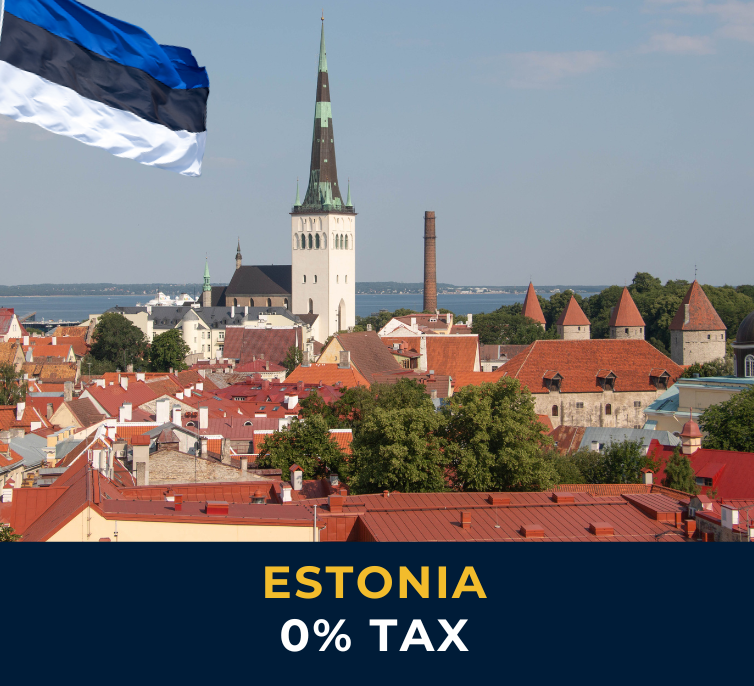Is it possible to be a resident of a country without even setting foot there?
And moreover, pay 0% taxes by opening a company there?
The innovative concept behind the world’s first digital residency, Estonia’s e-Residency, has captured the attention of thousands of digital nomads and entrepreneurs (myself included).
In addition, this phenomenon, combined with the country’s innovative and technological ecosystem, has focused the attention of Tax Nomads on Estonia’s opportunities and the advantages of its companies.
In fact, Estonia’s tax system virtues are internationally recognized, securing the top position in the Tax Competitiveness Index for the tenth consecutive year (considered the best tax code in the OECD) and boasting the highest rate of unicorns per capita in the world.

But…
Is all this hype really justified?
Is Estonia the best solution for the needs of the Tax Nomads?
What is e-Residency? Advantages and disadvantages
Estonia’s e-Residency, along with others like Palau’s, has caused considerable confusion regarding its characteristics and functionalities.
This confusion stems from the use of the term “residency”, which we commonly associate with residency permits or tax residency programs.
Paradoxically, to understand what Estonia’s e-Residency is and what it’s used for, it’s interesting to clarify what it is not, dispelling certain misconceptions:
- e-Residency is not a migratory or residency visa/permit. Per se, it does not grant the right for the holder to establish residency in Estonia.
- Therefore, it also does not provide access to Estonia’s public services such as healthcare or education.
- Obtaining e-Residency does not in any way lead to obtaining citizenship in Estonia.
- Being an e-Resident does not make you a tax resident of Estonia, nor does it influence residency determination in any tax treaty.
Given the above, e-Residency will not be useful if you were seeking a way to immigrate to Europe or benefit from Estonia’s tax regime as an individual.
So, what is the purpose of e-Residency?
The main utility of e-Residency is to obtain an identity for conducting remote administrative tasks and transactions with Estonia.
These tasks include: establishing a company in Estonia, signing contracts with digital signatures, paying taxes, etc.
In my experience as an e-resident, the user experience with the government platform is quite good, and bureaucratic processes are handled swiftly.
As a point of interest, the Estonian administration provides video tutorials (with English translations) for virtually every procedure.
However, the process of obtaining e-Residency is much slower and more tedious than one might expect.
In my case, it took about 7-8 weeks from application to receiving the necessary “kit” to log in to the portal (which I had to collect from the Estonian embassy).
On the other hand, the major disadvantage of e-Residency is the absence of significant advantages.
By this, I mean that over time, there aren’t significant differences between operating with e-Residency and other ways of managing a company abroad.

Pros and Cons of opening a company in Estonia
¡0% taxes! What could go wrong?
While Estonian companies are a useful tool in certain contexts, their features are often misunderstood and misinterpreted.
Benefits
- Corporate Income Tax rate of 0% for undistributed profits.
- This 0% tax rate also applies to capital gains from stocks, ETFs, and cryptocurrencies.
- 0% withholding tax on dividends and interest payments to owners.
- Unlike many other low-tax offshore companies, Estonian companies benefit from the reputation of being part of the EU.
- More lenient Controlled Foreign Company (CFC) rules compared to other EU member states. They do not apply if profits are below €750,000 or if the CFC is located in countries that have double taxation agreements with Estonia.
- Double taxation agreements with over 60 countries, reducing the tax burden for Estonian companies engaging in transactions with these countries.
Disadvantages
- Corporate Income Tax is applicable when distributing profits.
- Starting from 2025, the Corporate Income Tax rate will be 22% (previously 20%).
- This 22% tax does not eliminate the obligation to pay taxes on dividends received by an individual in their tax residence (which could amount to a total of 50%).
- As of 2024, the Value Added Tax (VAT) rate is 22%. Therefore, invoices to individuals in Europe will have to include this amount.
- Despite process digitalization, the incorporation times for a company in Estonia can exceed those of other jurisdictions (+2 months). This is due to the procedures required for obtaining e-Residency.
Moreover, operating through a company in Estonia involves expenses related to accounting services, the need for a local address, and a local contact person.
The latter is not necessarily a disadvantage, as costs are similar or even reduced compared to other jurisdictions.
However, it is worth noting that contrary to some beliefs, Estonian companies do not operate similarly to famous transparent LLCs.

How much does it cost to open a company in Estonia
The cost of establishing a company in Estonia can vary depending on:
- The type of company, such as a Private Limited Company (OÜ), Limited Partnership (UÜ), public limited company (AS), etc.
- The legal, accounting, or auditing services that are required.
However, we can get an idea of the prices typically associated with its most common type of company, the Private Limited Company (OÜ).
The cost of setting up an OÜ is much lower compared to other options, ranging from as little as €500 to a maximum of €1,500.
The monthly maintenance costs for an OÜ (including registered address, local contact, accounting, etc.) start at €100 and can increase based on the volume of transactions.
Managing a company in Estonia from your country
When discussing options in Estonia, it’s important to mention the factors involved in structuring and managing businesses with these frameworks from countries like Spain.
Frequently, individuals residing in countries such as Spain, Germany or France, characterized by high tax pressure and enforcement, seek ways to manage their businesses using these types of tools.
Unfortunately, it’s not always feasible, as these countries often have stringent regulations to prevent tax evasion.
Usually, these countries consider companies with their effective management within their territory as tax residents in that country.
This means that if the entity in Estonia lacks material and human resources for its business operations, and all services are provided from the other country, the tax authorities could determine that this entity is a tax resident in the said country and tax all non-prescribed periods.
However, it’s possible that both countries consider the entity a tax resident in the state where they have taxing authority.
If this occurs, given there is currently a double taxation agreement in force between both states, they would need to agree on where the entity should be considered tax resident.
This dispute process is not common as it involves the examination of numerous factors, making it lengthy and cumbersome.
Nevertheless, this does not eliminate the risk associated with operations as described above.
Lastly, it’s important to note that the Corporate Income Tax paid in Estonia upon profit distribution does not exempt the dividend recipient from paying taxes in their tax residence.
Once again, most countries apply high tax rates on such income, potentially nullifying efforts even with a well-structured setup in Estonia.

Our Review of Estonian Residency and Companies
In this instance, our opinion on the usefulness of Estonia and its companies will depend on the situation:
To operate a business from a tax hell
The probability is 99% that it is not of interest.
The justification for operations in Estonia is not profitable considering the small (sometimes negligible) tax advantages.
Operating from a favorable tax residency or as a nomad
If you enjoy territorial taxation in your tax residency, are exempt from personal taxes, or live a nomadic lifestyle, having a company in Estonia makes more sense than in the previous scenario.
However, in these cases, there are often better options available as well, depending on the specific needs of the business model.
Long-term businesses: capitalization and reinvestment
Estonian companies are an option we consider for clients with startups or long-term business plans requiring constant reinvestment and presence within the European Union.
As a subsidiary or holding company
In certain structures with tax-free offshore companies, an Estonian company can act as a subsidiary for invoicing clients in Europe, leveraging its reputation and EU identification number.
It is also useful for implementing holdings in the EU, as there is no withholding tax on dividends.
Becoming tax resident in Estonia
It’s not the most popular choice, but managing a company in Estonia from the country itself has certain advantages that few discuss:
- Profits distributed from an Estonian company to a tax resident of Estonia ARE exempt from personal income tax on dividends.
- It’s possible to defer taxes on capital gains from financial assets (e.g., stocks, bonds) similar to Corporate Income Tax using an instrument called “investment accounts.”
- Moderate to low cost of living and hiring by European standards, along with notable development, digitalization, and simplicity in bureaucratic processes.
In fact, these advantages led one of our clients, a lover of Nordic culture and the cold climate, to decide to establish their tax residence in this country.
As you can see, Estonia has its pros and cons.
We don’t like to commit exclusively to any jurisdiction or company, but we also avoid demonizing them.
Precisely as Tax Nomads, our task is to fairly evaluate the available tools and make use of those that best fit our needs.
Are you interested in obtaining residency or setting up a company in Estonia?
Or would you prefer a complete analysis of your situation to discover the best option for you?
In either case, we can help!
Simply request your FREE INITIAL CONSULTATION BY CLICKING HERE, or contact us directly via WhatsApp or through the form below.
Contact us
A company in Estonia enjoys several tax advantages, such as a 0% corporate income tax on undistributed profits and 0% withholding tax on dividends and interest.
However, corporate income tax is applicable when distributing profits, with a rate of 22% from 2025 onwards.
Additionally, the VAT rate is set at 22% from 2024.
These are some of the main tax burdens to consider when operating a company in Estonia.
The advantages of a company in Estonia are diverse. They include:
- 0% corporate income tax on undistributed profits
- 0% withholding tax on dividends and interest
- Commercial reputation as a European Union member state
- More lenient international tax transparency rules compared to other EU countries
- Double taxation agreements with over 60 countries
Estonia’s e-Residency is a pioneering program that allows individuals from anywhere in the world to obtain a digital identification, granting them access to online services and the ability to conduct administrative procedures with Estonia remotely.
Contrary to what its name might suggest, e-Residency does not confer rights to physical residency in Estonia nor does it affect tax residency.
Instead, it provides a platform for conducting business activities such as company formation, signing contracts with digital signatures, and paying taxes, all without the need to be physically present in the country.
A company in Estonia can be useful for optimizing tax burden, especially if you are exempt from personal taxes or lead a nomadic lifestyle.
It can also be a long-term option for businesses requiring constant reinvestment, as well as for more complex business structures such as subsidiaries or holdings.
Even with tax residency in Estonia, it offers benefits such as exemption from taxes on dividends and the ability to defer taxes on capital gains from financial assets.
The incorporation time can vary, but generally it can take more than two months due to the preliminary procedures required to obtain e-Residency.
Yes, you can manage a company in Estonia from your country. However, it’s important to consider fiscal and legal implications, especially regarding tax residency and effective management of the company.
It’s advisable to seek professional advice to ensure compliance with all applicable regulations and requirements.

